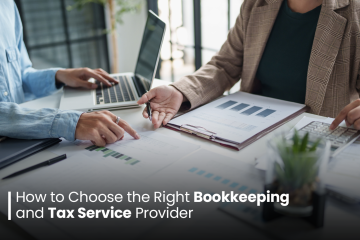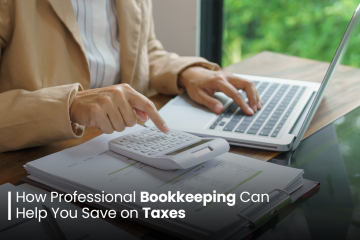When you’re dealing with real estate, people often mix up “property management accounting” and “real estate accounting.” However, these are actually two different things with separate focuses and purposes. Knowing the difference is super important so you can make good financial decisions, run your property business smoothly and make more money in the end.
Let’s grab a coffee and dive into these two key accounting areas. We’ll figure out why they’re important, where they connect and how outsourced accounting services can be a game-changer. Expect a helpful read that leaves you feeling confident and in charge of your real estate moves.
Management Accounting: Setting the Stage for Informed Decisions
Management accounting helps businesses make smart decisions. It’s not like regular accounting that just looks at what happened in the past. Management accounting dives into the data, predicts what might happen next and gives leaders the information they need to choose the best path forward.
In a nutshell, management accounting in real estate connects daily tasks to big goals, providing key data for smart financial choices and profit. It tracks money and market changes, revealing costs, income sources and performance metrics like occupancy rates and rental income. This transparency allows companies to adapt quickly, use resources efficiently, identify cost-saving opportunities and improve overall operations based on data. Ultimately, it helps real estate firms navigate challenges, seize opportunities and avoid pitfalls ensuring sustained growth.
Property Management Accounting: The Day-to-Day Finance Engine
Imagine running a busy hotel or a bunch of rental properties. You’ve got money coming in and going out all the time for stuff such as rent, repairs and utilities. That’s where property management accounting comes in. It’s all about keeping track of the money for your rentals. Whether you have just a few apartments, a whole commercial building or a ton of properties, this kind of accounting makes sure everything stays in good financial shape.
Key Functions of Property Management Accounting:
- Rent Collection and Tracking: Keep a close eye on all rent payments, make sure tenants pay when they should and deal with late or missed payments quickly.
- Expense Management: Track all expenses including regular upkeep, surprise fixes, utilities, property taxes and insurance by logging, categorizing and balancing them.
- Reporting Income and Expenses: Ensure you get solid income and expense reports, balance sheets and cash flow statements so you can keep an eye on how your properties are doing and spot any patterns.
- Budgeting and Forecasting: Cover budgeting for properties, figure out costs, see how seasons affect things and keep a close eye on the cash flow.
- Tenant Security Deposit Management: Keep security deposits separate and return them on time while following all state and local rules.
- Vendor Management: Keep tabs on what we owe contractors, service people and suppliers, double-check invoices are spot on and make sure everyone gets paid promptly.
- Operational Tax Compliance: Adhere to all applicable local, state and federal regulations along with management of property taxes and operational fees.
At its heart, this is all about the daily grind and keeping a close eye on the money. We just need to make sure rent covers all the bills and keeps our property investments profitable right now and down the line.
Real Estate Accounting: The Strategic, Big-Picture Perspective
Unlike property management accounting, which focuses on day-to-day stuff, real estate accounting gives you the big picture. It covers everything from buying and developing property to owning it, selling it and how the whole real estate business is doing financially.
Key Functions of Real Estate Accounting:
- Investment Analysis and Valuation: Take a deep dive into the numbers, figuring out if buying new properties or selling current ones makes financial sense. Think complex spreadsheets and forecasts.
- Loan and Debt Management: Handle the nitty-gritty of loan management from tracking all the details and payments to making sure everything lines up with the rules and regulations.
- Tax Optimization and Strategy: Plan for depreciation, use credits you’re owed, find all possible deductions and stay on top of the rules so you pay the least you legally can.
- Asset Management and Portfolio Performance: Keep an eye on how our properties are doing over time including their condition and value. Moreover, let’s track any upgrades we make and stay on top of what’s happening in the market.
- Development Accounting: Keep tabs on every expense for land, building, permits and everything else involved in development.
- Portfolio Management and Strategic Decisions: Assess all investments to figure out the best times to buy, sell or add new things to our portfolio, all to reach our financial goals over time.
- Comprehensive Financial Reporting: Investment reports, financial statements, partner capital accounts, and tax summaries, all being prepared.
Real estate accounting is way bigger, more complicated and really plans ahead. It’s all about making money back on investments, growing your property collection for the long haul, increasing asset value and saving on taxes. They usually use accrual accounting to get a full picture of the finances.
Property Management Accounting vs. Real Estate Accounting: What’s the Difference?
To put it into perspective, here’s a quick comparison:
| Aspect | Property Management Accounting | Real Estate Accounting |
| Scope | Day-to-day operational finances of specific properties. | Long-term investment strategies, asset management, and tax implications across a portfolio. |
| Focus Area | Rent collection, expense management, tenant relations, property-level profitability. | ROI, capital appreciation, portfolio diversification, tax optimization, financing. |
| Primary Goal | Ensure properties are financially viable and operationally efficient. | Maximize long-term wealth, optimize tax burdens, and grow investment portfolio. |
| Reports Produced | Income & expense statements (P&L), cash flow statements, tenant ledgers. | Financial statements (balance sheets, income statements, cash flow for entities), asset valuations, partnership reports, tax returns. |
| Key Metrics | Occupancy rates, rent collection rates, operational expenses per unit, NOI per property. | IRR, ROI, equity multiple, debt-to-equity ratios, cap rates. |
| Stakeholders | Property owners, tenants, property managers, maintenance staff. | Developers, investors, lenders, accountants, tax authorities. |
| Time Horizon | Short-term, immediate operational performance. | Long-term, strategic investment performance. |
| Accounting Method Often | Cash-basis for simpler operations, accrual for more complex. | Primarily accrual basis. |
Knowing the ins and outs of property types and how to manage them is key to doing well in real estate. It helps you put resources where they matter, use the right expertise and hit your goals; which means growth, profits and lasting value. When you manage each property differently, you get the best results and stay ahead of the competition. This kind of planning is what keeps your investments strong and flexible in the long run.
The Indispensable Role of Management Accounting in Real Estate
Management accounting basically ties everything together. It looks at the nitty-gritty cash flow stuff for each property and also the big picture ROI for the whole portfolio using key performance data.
- Operational Excellence: Property managers use management accounting to spot areas for improvement, cut costs and keep each property’s budget healthy and profitable.
- Strategic Decision-Making: For investors, management accounting is key. It helps them dive into the numbers, spot good investments, understand the risks and decide where to put their money, whether it’s buying, selling or just distributing funds across everything they own.
In a nutshell, management accounting makes sure everyday performance numbers and short-term data connect smoothly with the big-picture financial goals. This gives a complete view that really helps real estate companies grow and thrive over time.
Why You Should Seriously Consider Outsourced Accounting Services?
You need solid accounting tools, clear reports and expert financial advice to handle property finances or big investments. Hiring a full accounting team can be pricey and hard to manage. Thus, many real estate pros are choosing outsourced accounting services as a smart move.
Compelling Benefits of Outsourcing Your Accounting:
- Significant Cost Efficiency: Skip the big costs of having your own team. Imagine paychecks, perks, office stuff and software bills; all taken care of.
- Unmatched Scalability: Need to ramp up or down your support? No problem! Scale it flexibly to fit your changing portfolio or investment activities as they grow.
- Access to Expert Accuracy and Specialization: Get instant help from property and real estate finance pros for spot-on accuracy and compliance.
- Leveraging Cutting-Edge Technology: Get access to top-notch accounting software and cloud platforms without the tech headaches.
- Focus on Your Core Business: Let us take care of the day-to-day tasks so you can concentrate on growing your real estate business like buying properties, handling tenants and planning your next big investment.
- Enhanced Data Security: Using professional outsourcers can really boost your data security. They usually have way better systems in place than a small internal team could manage.
Accounting outsourcing is really taking off, set to hit $75.2 billion worldwide by 2030. More and more businesses are handing over their accounting to specialists which helps them save money and work more efficiently. This big change in how things are done lets companies focus on what they’re best at and get ahead by working with the right partners.
Conclusion: Why These Disciplines Matter for Your Success?
Real estate accounting and property management accounting may sound similar but they actually handle very different financial aspects. In order to really succeed in real estate financially, you need both detailed, daily accounting for property management and big-picture financial strategies from real estate accounting. Knowing the difference helps you tackle any financial challenge that comes your way, whether it’s a small budget or a huge investment plan.
Do you need solid growth, less stress and better decisions? Imagine working with outsourced accounting experts. They’ll smooth out your operations and help you chase those big expansion goals. Let’s be real, in today’s wild real estate game, having top-notch financial help isn’t just nice to have; it’s a total game-changer.
In order to really nail real estate success, you have to use the right tools, hand off tasks that aren’t your main thing and weave financial management into everything you do. That way, you’ll crush it now and be set up to come up with new ideas and win big later.Do you want to get your real estate finances sorted? Reach out to Glocal Accounting today and see how our outsourced accounting services can help boost your property management and investment plans.



0 Comments